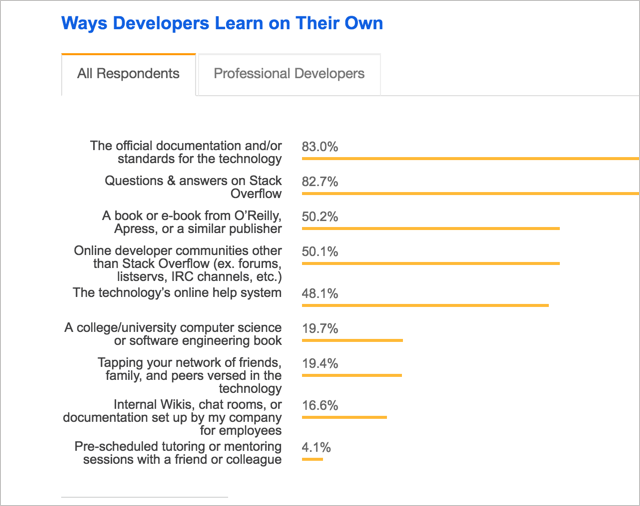What can we learn from the homogenous profiles in the Stack Overflow 2018 survey?
The 2018 Stack Overflow results are available here. First, you might ask, what’s relevant to documentation? The survey found that:
Over 80% of respondents rely on Stack Overflow Q&A when learning something new. Additionally, developers understand the value of good documentation, as over 80% also use documentation as a resource when learning.

Additionally, the survey found that
Python has risen in the ranks of programming languages on our survey, surpassing C# in popularity this year, much like it surpassed PHP last year.
This is good, because there are many good resources online for learning Python.
However, this isn’t what surprised me the most. Here’s what caught my attention. Of the 100,000 survey participants —
- 92.9% are male
- 74.2% are white or of European descent
- 93.2% are straight or heterosexual
- 67% are 25-44 years old
- 71.1% have no children or dependents
Holy smokes! The lack of diversity in the engineering population (which frequents Stack Overflow) is dismal. Your basic engineer is a 30-year-old straight white male with no kids.
Does lack of diversity matter? Many have pointed out that products designed by non-diverse companies (by “brogrammers”) tend to be shortsighted. Also, this past year, Silicon Valley saw sexual harassment scandal after scandal. For example, see Silicon Valley figures get swept up in the unfolding sexual-harassment crisis. The article quotes the New York magazine saying,
Silicon Valley has a culture problem. The list of allegations of sexual harassment, assault, and discrimination against women in the tech industry seems to grow daily.
If you recall from a previous post on value, I quoted an excerpt from Emily January Petersen’s article Articulating Value Amid Persistent Misconceptions About Technical and Professional Communication in the Workplace (Technical Communication, 2017). Petersen interviewed 39 women in tech comm to see whether others in the company value their role and contributions as technical writers. She found that many tech writers are essentially treated like secretaries, and their work was minimized as merely fixing grammar or making other cosmetic improvements. Petersen writes,
Overall, according to the interview data, TPC [Technical and Professional Communication] is misconceived as cosmetic, secretarial, unarticulated across disciplines, unnecessary, invisible, and unquantifiable, which means such workers often feel expendable.
I can’t help but wonder if the devaluation of technical writing roles in the workplace has some connection with the homogeneous male engineering culture. In Why Can’t Silicon Valley Solve Its Diversity Problem? Anna Wiener writes,
The tech industry is metrics-obsessed, always optimizing, and eager to find technical fixes for inefficiencies. But the conversation about diversity in tech is also a conversation about social change—about economic inequality, access to education, and the latent racism and sexism of an industry that prides itself on building the future. It’s about the social insularity of Silicon Valley, and the insistence on clustering along a forty-mile strip of land, despite the ballooning international reach of technology products.
The diversity-in-engineering issue isn’t new, and I don’t have any solutions or novel insights here; I just wanted to highlight the most interesting results from the Stack Overflow survey.
About Tom Johnson

I'm an API technical writer based in the Seattle area. On this blog, I write about topics related to technical writing and communication — such as software documentation, API documentation, AI, information architecture, content strategy, writing processes, plain language, tech comm careers, and more. Check out my API documentation course if you're looking for more info about documenting APIs. Or see my posts on AI and AI course section for more on the latest in AI and tech comm.
If you're a technical writer and want to keep on top of the latest trends in the tech comm, be sure to subscribe to email updates below. You can also learn more about me or contact me. Finally, note that the opinions I express on my blog are my own points of view, not that of my employer.

